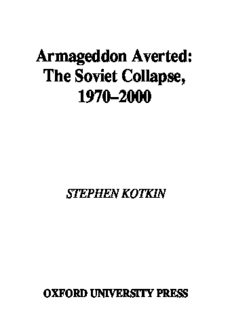
Armageddon Averted: The Soviet Collapse, 1970–2000 PDF
Preview Armageddon Averted: The Soviet Collapse, 1970–2000
Armageddon Averted: The Soviet Collapse, 1970–2000 STEPHEN KOTKIN OXFORD UNIVERSITY PRESS Armageddon Averted This page intentionally left blank Armageddon Averted The Soviet Collapse, 1970–2000 STEPHEN KOTKIN 1 1 Oxford New York Auckland Bangkok BuenosAires CapeTown Chennai DaresSalaam Delhi HongKong Istanbul Karachi Kolkata KualaLumpur Madrid Melbourne MexicoCity Mumbai Nairobi SãoPaulo Shanghai Taipei Tokyo Toronto © Stephen Kotkin 2001 The moral rights of the author have been asserted First published by Oxford University Press, Inc., 2001 First published as an Oxford University Press paperback, 2003 198 Madison Avenue, New York, New York 10016 www.oup.com Oxford is a registered trademark of Oxford University Press All rights reserved. No part of this publication may be reproduced, stored in a retrieval system, or transmitted, in any form or by any means, electronic, mechanical, photocopying, recording, or otherwise, without the prior permission in writing of Oxford University Press. Library of Congress Cataloging in Publication Data Kotkin, Stephen. Armageddon averted : the Soviet collapse, 1970–2000 / Stephen Kotkin. p. cm. Includes bibliographical references and index. ISBN0–19–280245–3 (cloth) ISBN 0–19–516894–1 (pbk.) 1. Soviet Union—History—1953–1985. 2. Soviet Union—History—1985–1991. 3. Communism—Soviet Union—History. I. Title DK274. K6352001 947.08521 12589041 1 3 5 7 9 10 8 6 4 2 Printed in the United States of America on acid-free paper In memory of my great-grandfather Michael Korolewicz (1889–1969) who had been a teacher in tsarist Poland and in America built a chrome, silver, and gold plating business. He used to take me to the park, beginning when I was in a stroller, and talk history. This page intentionally left blank Preface to the paperback edition Never will I forget coming back evenings to the Vyborg Hotel in Leningrad, in 1984, and seeing a hat or article of clothing afloat in the nearby Black Gulch (Chernaia rechka), indicating that another drunk had fallen in and drowned. Even today, some academics continue to debate whether the Soviet system could reform, but the substan- tive question was whether it could reform and be stabilized in the face of a capitalist West utterly transformed after World War II. In those specific circumstances, socialist reform (liberalization) entailed collapse. Perversely, it was the Communist fable of a Lenin supposedly gentler than Stalin—the myth of socialism with a human face— that triggered the benign demise of Lenin’s police state. The Black Gulch swallowed itself, but it left an immense residue. After 1991, the myths of ‘reform’ and of Western ‘aid’ helped deflect a full reckoning with the Communist era. In the two years since this book was published (three since it was written), Russia has continued to offer en- couragement, with undercurrents of disquiet. Besides an appreciable learning curve, the overriding influences on further development (or lack thereof) remain the Soviet inheritance: the oil and resource-dominated economy, the world context, and the growing urge to compete more vii preface to the paperback edition effectively in it. Russia’s strategic setting astride Europe, the Middle East, and the Far East, its U.N. Security Council veto, and Soviet-era doomsday arsenal focus attention. But Russia’s long-term prospects will be determined by the vicissitudes of internal transformation, especially of its unreconstructed military-security apparatus, its judiciary, and its regulatory agencies. Even many officials now recognize a need to enhance the conditions for small and medium businesses and average property owners and to reinvest liberally in the country’s notable educational system. Pragmatic foreign policy pursuits include closer ties rooted in mutual interest with all neighbors, particu- larly with Europe but also the United States, belated admission into the World Trade Organization, and some day, a GDP to match Portugal’s. Thanks are due to my new editors at OUP New York, Peter Ginna and Linda Robbins, and to readers and reviewers who pointed out errors, which have been corrected. A chapter prepared for the hardback on the new states besides Russia—excised for space reasons— appeared separately as ‘Trashcanistan,’ The New Republic, 15 April 2002 (www.tnr.com). viii Preface My first encounter with the Soviet bloc took place one summer in 1983. As a graduate student of Habsburg his- tory, I made my way to Prague from northern California to advance my language skills in pursuit of a bygone empire. On the day of my arrival in the capital of Bohemia, I dis- covered a mass ‘socialist peace rally’. Surprised to hear a familiar voice booming over the loudspeakers, I pushed my way through the crowd to the front, and sure enough it was him: the then socialist mayor of Berkeley. Socialism in the bloc turned out to be nothing like what I, as an American, had been led to believe. Rather than an ironclad dictatorship in a world completely unto itself, or an unremarkable system gradually converging with that of the West, it proved to be very different from the West yet increasingly penetrated by the West, and its highly rigid structures had to be constantly circumvented to make them function. It was full of incessant complaining but also thoroughgoing conformism, and had a relatively impoverished material culture but a richly engaging sociability. I made up my mind that, upon returning to the University of California, I would begin the study of Russian, and switch empires. These were the days of Polish Solidarity and its under- ground ‘flying universities’, which were hailed as ‘civil ix
Description: